| Listing 1 - 9 of 9 |
Sort by
|
Book
Year: 1980 Publisher: Cambridge, Mass. National Bureau of Economic Research
Abstract | Keywords | Export | Availability | Bookmark
 Loading...
Loading...Choose an application
- Reference Manager
- EndNote
- RefWorks (Direct export to RefWorks)
This paper assesses the empirical relevance of "dynamic" factors in industrialization in developing countries. Using data from a sample of 91 firms, rates of growth of output per unit of input are calculated. It is shown that there is little basis, at least with regard to Turkish experience, to the notion that non-traditional industries are in some sense more "dynamic" than traditional industries.
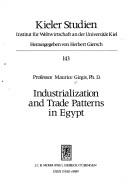
ISBN: 3163402011 Year: 1977 Publisher: Tübingen Mohr
Abstract | Keywords | Export | Availability | Bookmark
 Loading...
Loading...Choose an application
- Reference Manager
- EndNote
- RefWorks (Direct export to RefWorks)
Import substitution --- Industrialization --- Egypt --- Commerce. --- Commercial policy.
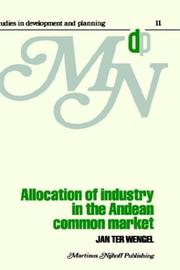
ISBN: 0898380200 Year: 1980 Publisher: Boston Nijhoff
Abstract | Keywords | Export | Availability | Bookmark
 Loading...
Loading...Choose an application
- Reference Manager
- EndNote
- RefWorks (Direct export to RefWorks)
Import substitution --- Industries --- Acuerdo de Cartagena.
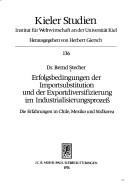
ISBN: 3163382517 Year: 1976 Publisher: Tübingen Mohr
Abstract | Keywords | Export | Availability | Bookmark
 Loading...
Loading...Choose an application
- Reference Manager
- EndNote
- RefWorks (Direct export to RefWorks)
Commercial policy --- Foreign trade promotion --- Import substitution
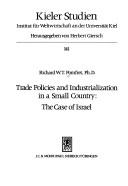
ISBN: 3163388310 Year: 1976 Publisher: Tübingen Mohr
Abstract | Keywords | Export | Availability | Bookmark
 Loading...
Loading...Choose an application
- Reference Manager
- EndNote
- RefWorks (Direct export to RefWorks)
Foreign trade promotion --- Import substitution --- Israel --- Commerce. --- Economic conditions.

ISBN: 0816607281 Year: 1975 Publisher: Minneapolis (Minn.): University of Minnesota
Abstract | Keywords | Export | Availability | Bookmark
 Loading...
Loading...Choose an application
- Reference Manager
- EndNote
- RefWorks (Direct export to RefWorks)
Automobile industry and trade --- Automobile supplies industry --- Foreign trade regulation --- Import substitution --- Industries
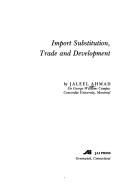
ISBN: 0892320559 9780892320554 Year: 1978 Volume: 11 Publisher: Greenwich (Conn.): JAI Press,
Abstract | Keywords | Export | Availability | Bookmark
 Loading...
Loading...Choose an application
- Reference Manager
- EndNote
- RefWorks (Direct export to RefWorks)
Foreign trade. International trade --- Import substitution --- Commerce --- Economic development --- 339.54 --- Import substitution. --- Substitution of imports --- Commercial policy --- Industrial promotion --- Development, Economic --- Economic growth --- Growth, Economic --- Economic policy --- Economics --- Statics and dynamics (Social sciences) --- Development economics --- Resource curse --- Trade --- Business --- Transportation --- Buitenlandse economische politiek. Buitenlandse handelspolitiek. Instrumentarium van de buitenlandse handel --- 339.54 Buitenlandse economische politiek. Buitenlandse handelspolitiek. Instrumentarium van de buitenlandse handel --- Traffic (Commerce) --- Merchants
Book
ISBN: 9781400880942 1400880947 0691162913 9780691162911 Year: 2016 Publisher: Princeton, N.J. Princeton University Press
Abstract | Keywords | Export | Availability | Bookmark
 Loading...
Loading...Choose an application
- Reference Manager
- EndNote
- RefWorks (Direct export to RefWorks)
Brazil is the world's sixth-largest economy, and for the first three-quarters of the twentieth century was one of the fastest-growing countries in the world. While the country underwent two decades of unrelenting decline from 1975 to 1994, the economy has rebounded dramatically. How did this nation become an emerging power? Brazil in Transition looks at the factors behind why this particular country has successfully progressed up the economic development ladder. The authors examine the roles of beliefs, leadership, and institutions in the elusive, critical transition to sustainable development.Analyzing the last fifty years of Brazil's history, the authors explain how the nation's beliefs, centered on social inclusion yet bound by orthodox economic policies, led to institutions that altered economic, political, and social outcomes. Brazil's growth and inflation became less variable, the rule of law strengthened, politics became more open and competitive, and poverty and inequality declined. While these changes have led to a remarkable economic transformation, there have also been economic distortions and inefficiencies that the authors argue are part of the development process.Brazil in Transition demonstrates how a dynamic nation seized windows of opportunity to become a more equal, prosperous, and rules-based society.
E-books --- Brazil --- Economic policy. --- Social policy. --- Politics and government. --- Economic policy and planning (general) --- Internal politics --- BUSINESS & ECONOMICS / Development / Economic Development. --- Argentina. --- Brazil. --- Brazilian economy. --- Brazilian miracle. --- Brazilian society. --- Dilma Rousseff. --- Fernando Henrique Cardoso. --- IPF. --- Luiz Incio Lula da Silva. --- Plano Real. --- beliefs. --- business sector. --- competitive processes. --- conceptual dynamic. --- critical transition. --- critical transitions. --- democracy. --- development. --- developmentalism. --- dominant networks. --- economic development. --- economic policy. --- emerging power. --- illiterates. --- import substitution. --- inductive framework. --- inflation. --- institutional change. --- institutional changes. --- institutional deepening. --- institutional possibility frontiers. --- leadership. --- middle class. --- military government. --- military regime. --- political elites. --- political rights. --- political transition. --- presidency. --- public goods. --- redemocratization. --- reform process. --- social inclusion. --- stasis. --- sustainable development.

ISBN: 0691058962 0691011389 9780691011387 9780691058962 0691213011 Year: 1998 Publisher: Princeton, N.J.,
Abstract | Keywords | Export | Availability | Bookmark
 Loading...
Loading...Choose an application
- Reference Manager
- EndNote
- RefWorks (Direct export to RefWorks)
About two hundred years ago, largely as a result of Adam Smith's Wealth of Nations, free trade achieved an intellectual status unrivaled by any other doctrine in the field of economics. What accounts for the success of free trade against then prevailing mercantilist doctrines? And how well has free trade withstood various theoretical attacks that have challenged it since Adam Smith's time? In this readable intellectual history, Douglas Irwin explains how the idea of free trade has endured against the tide of the abundant criticisms that have been leveled against it from the ancient world and Adam Smith's day to the present. An accessible, nontechnical look at one of the most important concepts in the field of economics, Against the Tide will allow the reader to put the ever new guises of protectionist thinking into the context of the past and discover why the idea of free trade has so successfully prevailed over time. Irwin traces the origins of the free trade doctrine from premercantilist times up to Adam Smith and the classical economists. In lucid and careful terms he shows how Smith's compelling arguments in favor of free trade overthrew mercantilist views that domestic industries should be protected from import competition. Once a presumption about the economic benefits of free trade was established, various objections to free trade arose in the form of major arguments for protectionism, such as those relating to the terms of trade, infant industries, increasing returns, wage distortions, income distribution, unemployment, and strategic trade policy. Discussing the contentious historical controversies surrounding each of these arguments, Irwin reveals the serious analytical and practical weaknesses of each, and in the process shows why free trade remains among the most durable and robust propositions that economics has to offer for the conduct of economic policy.
338 <09> --- 339.54 --- Economische geschiedenis --- Buitenlandse economische politiek. Buitenlandse handelspolitiek. Instrumentarium van de buitenlandse handel --- Freihandel. --- Geschichte. --- Wirtschaftstheorie. --- Welthandel. --- Freihandel --- Geschichte --- Wirtschaftstheorie --- 339.54 Buitenlandse economische politiek. Buitenlandse handelspolitiek. Instrumentarium van de buitenlandse handel --- 338 <09> Economische geschiedenis --- Free trade --- Free trade -- Protection --- Free trade and protection --- Libre circulation des marchandises --- Libre échange et protectionnisme --- Libre-échange --- Libre-échange -- Protection --- Libre-échange et protectionnisme --- Libre-échangisme --- Libéralisation des échanges --- Libération des échanges --- Trade [Free ] --- Trade liberalization --- Vrijhandel --- Vrijhandel -- Bescherming --- Vrijhandel en protectionisme --- #ECO:01.07:economie handel nationaal internationaal --- 810 Theorie en Methode --- 815 Geschiedenis --- 824 Globalisering --- 830 Economie --- 831 Internationale Politieke Economie --- 831.1 Handelspolitiek --- 882.4 Noord-Amerika --- 884.2 Noord-Europa --- 884.4 West-Europa --- Trade, Free --- Free trade. --- Libre-échange --- Foreign trade policy --- 382.0 --- 382.33 --- AA / International- internationaal --- International trade --- Algemeenheden. Techniek en praktijk van de internationale handel. Internationale economische betrekkingen --- Alexander, Sidney. --- Anderson, Karl. --- Bhagwati, Jagdish. --- Cairnes, John E. --- Chipman, John. --- Corn Laws. --- Davenant, Charles. --- Eaton, Jonathan. --- Edgeworth, F. Y. --- Hamilton, Alexander. --- Hicks, John R. --- Janssen, Theodore. --- King, Charles. --- Langholm, Odd. --- List, Friedrich. --- McCulloch, John Ramsay. --- Oswald, James. --- Petyt, William. --- Ricardo, David. --- Schumpeter, Joseph. --- Torrens, Robert. --- barter nature of trade. --- foreigners, aversion to. --- import substitution. --- natural liberty. --- History. --- Histoire
| Listing 1 - 9 of 9 |
Sort by
|

 Search
Search Feedback
Feedback About UniCat
About UniCat  Help
Help News
News